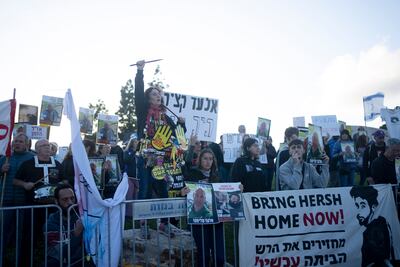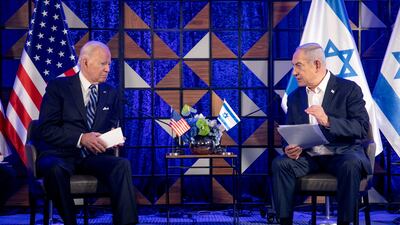Live updates: Follow the latest on Israel-Gaza
On February 26, President Joe Biden said he was hopeful a six-week ceasefire and hostage-release deal would soon be brokered in Gaza, before the start of Ramadan.
But on Wednesday, the first day of Eid, the holiday marking the end of the Muslim fasting month, a ceasefire seemed more elusive than ever as an Israeli air strike killed three sons of Hamas's top political leader Ismail Haniyeh and three of his grandchildren.
During Ramadan, the death toll in Gaza has mounted and the humanitarian situation has only grown worse. The fate of the hostages taken by Hamas and other militant groups is largely unknown.
Internationally mediated ceasefire talks are taking place in Cairo and US officials this week said an offer has been handed to Hamas.
“Hamas, they need to move on the proposal that has been made,” Mr Biden said on Wednesday during a joint news conference with Japan's Prime Minister Fumio Kishida.
Mr Biden, who is running for re-election in November, has become increasingly critical of Israeli Prime Minister Benjamin Netanyahu.
“I have been very blunt, straightforward with [Mr Netanyahu],” Mr Biden said on Wednesday. “We’ll see what he does in terms of meeting the commitments he made to me.”
More than 33,000 Palestinians have been killed since October 7, according to authorities in Gaza, and a famine is looming, even amid efforts in recent days to increase the flow of aid.
Last week, the Israeli military killed seven World Central Kitchen aid workers in Gaza. Israel said it had mistakenly thought they were Hamas operatives.
“I think what [Mr Netanyahu] is doing is a mistake, I don’t agree with his approach,” Mr Biden said in an interview with a Spanish-language broadcaster aired on Tuesday.
He urged Israel to call for a six-to-eight-week ceasefire and allow humanitarian aid to freely move into the Gaza Strip.
“There's no excuse to not provide for the medical and the food needs of those people – this should be done now,” he added.
Experts say the shift in tone is significant, though so far, it has not been backed up by policy changes.
“While the rhetorical shifts are important, it's more important for President Biden to take action to ensure that Israel is held accountable for its violations of US law and international law, which means cutting off us weapons to Israel,” said Josh Ruebner, adjunct professor of justice and peace studies at Georgetown University.
“It should be a very clear cut decision that the Biden administration should take,” Mr Ruebner told The National.
Since the October 7 Hamas attacks on Israel that killed about 1,200 people, according to Israeli counts, Mr Biden has been an unequivocal supporter of Israel, enabling arms sales and resisting international and domestic calls to support a permanent ceasefire.
Meanwhile Mr Netanyahu faces a growing protest movement at home, primarily over the plight of the hostages that remain captivity after more than six months.
“For pretty much every Israeli who does not support the current government, the worst case scenario is that the government continues, the war completely isolates Israel and we lose all our major allies, who eventually stop sending arms meaning Israel loses the ability to achieve anything,” Israeli pollster Dahlia Scheindlin told The National.
“Two thirds of Israelis want early elections, because roughly they think that this government is leading Israel towards that worst-case scenario.”

After the attack on the World Central Kitchen aid workers, Israeli troops withdrew from the Gazan city of Khan Younis and unprecedented amounts of humanitarian aid crossed into the strip.
The seeming sudden change to Israel’s war strategy sparked anger among Mr Netanyahu’s far-right political allies, who have accused him of weakening the war effort and abandoning a planned invasion of the southern Gazan city of Rafah. Washington opposes such a move unless plans are in place to protect the more than one million people sheltering in the southern city.
Gaza analyst Talal Awkal called the withdrawal a political manoeuvre aimed at demonstrating to mediators that Israel is responding to American demands for progress in the hostage talks, and therefore put pressure on Hamas.
“But the war is not over, and they might well come to Rafah later on to get what Netanyahu has called ‘complete victory’,” Mr Awkal told The National.
“Netanyahu is really in a corner because of US and international pressure.”

